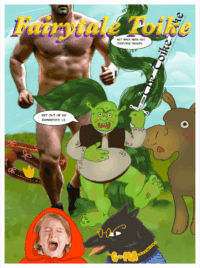Romeo and Juliet? Nah, it should be Romeo and JuliEN. Lesbian or gay, it doesn’t matter, but I think it’s worth noting that the name “Romeo” has more cultural significance, so if you’ve got to change one it should be Juliet. See I’ve always said that Romeo and Juliet is gay, don’t agree with me? Seriously, it’s about two young people who aren’t allowed to be together because of what the people surrounding them believe. Then they run away together because they’re ‘so incredibly devoted to each other’.
To clarify two things. There’s disagreement on whether Romeo is young or not. After having analyzed that stupid piece of media for months, I do believe he is young, meaning that the age gap between him and Juliet is not inappropriate. I think this is the case, not only because it has been confirmed by some sources, but also because the behavior he exhibits is so incredibly teenage boy coded, that no grown man would ever behave the way he does. The other thing is that people seem to interpret the play, not as a love story necessarily, because there is so much destruction and it may not seem like Romeo and Juliet’s love is genuine. For the sake of simplicity we’re going to say that it is, because I want it to be. Also, it’s like an old as fuck play and it’s fictional! Of course it’s not going to be realistic.
With that clarification out of the way we can confidently conclude that Romeo and Juliet is a dramatic love story, with an appropriate age gap. The lovers fall in love at first sight, and are engaged in a love so passionate that they immediately wanna spend all their life together (that kind of sounds lesbian coded not gonna lie – I mean, come on, u-hauling already?). Romeo is willing to travel so far just to live a peaceful life with Juliet. That’s pretty lesbian coded as well actually, like the one lesbian who traveled to Canada from Russia on a little boat just to be with her lover. Maybe they’re lesbians… not gay men…
So they’re kept apart because of the beliefs of their family (sounds a little like homophobia to me personally). And they’re willing to DIE for each other. No sorry, they DO NOT WANT TO LIVE WITHOUT ONE ANOTHER. … “Fellas, is it gay to die for the one you love?” YES, YES IT IS SO FUCKING GAY!!!
Also, outside of that, if you actually read the first act. There is SO much sexual tension in those fight scenes. Let’s not forget that William Shakespeare is also such a bi-con. And I mean: QUEER ARTISTS MAKING QUEER ART! Right?
I will now go through some excerpts of the play and explain why they are/should be gay.
Take this scene for example, from Act 1, Scene 5:
“Juliet: Go ask his name. The Nurse goes. If he is married,
My grave is like to be my wedding bed.
Nurse returning: His name is Romeo, and a Montague,
The only son of your great enemy.
Juliet: My only love sprung from my only hate!
Too early seen unknown, and known too late!”
This is right after the dance at the Capult palace, that Romeo snuck into and where Romeo and Juliet fell in love at first sight. Juliet finds out that Romeo is a Montague, her family’s major enemy. “My only love sprung from my only hate”? What does that sound like to you? If you said falling in love with someone who is not of the opposite sex or gender despite consistent homophobia from the people around you then you are correct!! So then, “that I must love a loathed enemy” can translate to being in love with someone who your entourage would hate you being in love with. Sounds like a gay couple in the making! (Who is surrounded by homophobia of course).
Ah, the famous balcony scene, from Act 2, Scene 2:
“ Enter Juliet above
Romeo: But soft, what light through yonder window breaks?
It is East, and Juliet is the sun.
Arise, fair sun, and kill the envious moon,
[…]
O, that I were a glove upon that hand,
That I might touch that cheek!
Juliet: Ay me!
Romeo aside: She speaks
O, speak again, bright angel! for thou art
[…]
Juliet: O Romeo, Romeo! wherefore art thou Romeo?
Deny thy father and refuse thy name;
Or, if thou wilt not, be but sworn my love,
And I’ll no longer be a Capulet.
Romeo aside: Shall I hear more, or shall I speak at this?
Juliet: ‘Tis but thy name that is my enemy;
Thou art thyself, though not a Montague.
What’s Montague? it is nor hand, nor foot,
Nor arm, nor face, nor any other part
Belonging to a man. O, be some other name!
What’s in a name? that which we call a rose
By any other name would smell as sweet;
So Romeo would, were he not Romeo called,
Retain that dear perfection which he owes
Without that title. Romeo, doff thy name,
And for that name which is no part of thee
Take all myself.”
Declaring your love from the garden below your sweetheart’s balcony because you can’t be seen together? GAY. Also they use some of the most flowery and dramatic language ever. That’s literally so goddamn fruity. Need I say more?
(I love this line “what’s in a name? That which we call a rose by any other name would smell as sweet”. I don’t have anything to say on it, it’s just very great. Here it’s being used to highlight how the name and connotation attached to Montague do not define Romeo as a person. We can use this to conclude that a person’s association with something, say, being part of the LGBTQ+ community, doesn’t take away anything from the value of a person.)
Let us visit one last quote here, from Act 5, Scene 3:
“Romeo: […] Ah, dear Juliet,
Why art thou yet so fair? Shall I believe
That unsubstantial death is amorous,
And that the lean abhorrèd monster keeps
Thee here in dark to be his paramour?
For fear of that I still will stay with thee
And never from this palace of dim night
Depart again. Here, here will I remain
With worms that are thy chambermaids. O, here
Will I set up my everlasting rest
And shake the yoke of inauspicious stars
From this world-wearied flesh! Eyes, look your last.
Arms, take your last embrace. And, lips, O, you
The doors of breath, seal with a righteous kiss
A dateless bargain to engrossing death.
Kissing Juliet.
Come, bitter conduct, come, unsavory guide!
Thou desperate pilot, now at once run on
The dashing rocks thy seasick weary bark!
Here’s to my love. Drinking. O true apothecary,
Thy drugs are quick. Thus with a kiss I die.
He dies.
[…]
Juliet: O comfortable friar, where is my lord?
I do remember well where I should be,
And there I am. Where is my Romeo?
Friar Lawrence: I hear some noise.—Lady, come from that nest
Of death, contagion, and unnatural sleep.
A greater power than we can contradict
Hath thwarted our intents. Come, come away.
Thy husband in thy bosom there lies dead,
And Paris, too. Come, I’ll dispose of thee
Among a sisterhood of holy nuns.
Stay not to question, for the watch is coming.
Come, go, good Juliet. I dare no longer stay.
Juliet: Go, get thee hence, for I will not away.
He exits.
What’s here? A cup closed in my true love’s hand?
Poison, I see, hath been his timeless end.—
O churl, drunk all, and left no friendly drop
To help me after! I will kiss thy lips.
Haply some poison yet doth hang on them,
To make me die with a restorative.
She kisses him.
Thy lips are warm!
Enter Paris’s Page and Watch.
Watch: Lead, boy. Which way?
Juliet: Yea, noise? Then I’ll be brief. O, happy dagger,
This is thy sheath. There rust, and let me die.
She takes Romeo’s dagger, stabs herself, and dies.”
I don’t know man… they way they just like DIED for each other with so much poetic drama. Romeo literally KILLED someone to be with his DEAD wife. Fellas is it gay— YES IT IS, IT IS VERY GAY! The couple lies down together to die… just like a certain pair of gay prehistoric skeletons. Need I say more?
To look at this in another perspective, yes, this might be a little dark, but we know that throughout history and even now still, queer people lose their life because they would rather not live than not be able to live out their queerness. I feel that the consecutive deaths of Romeo and Juliet parallels this in some way. They would rather kill themselves than live a life where they cannot be with the person they love. I believe this can be interpreted as a very queer sentiment.
Lastly, at the ending of the play, Act 5, Scene 3, the heads of the two families, Montague and Capulet reconcile. They only do so because of the deaths of their children, which they understand has been caused by their rivalry. This parallels the experience of many homophobic parents who have lost their child due to a reason that relates to their queerness. Often, homophobic parents can become some of the most fierce ally’s if they are able to accept and understand the context and reason for their child’s death.
As a final remark, I don’t think Shakespeare meant to write Romeo and Juliet as gay-coded, I mean, he did rip-off some other guy. And queer literature didn’t come to exist as such until centuries later. However, as with any work of literature, the reader has the freedom to interpret and analyze it through whatever lens they so desire to. I think it’s funny to claim that what is globally praised as one of the greatest works of English literature is gay, and it’s interesting to apply a modern analysis to an old work of literature. A queer analysis of this work could be light hearted, we could look at the jokes and innuendo between the characters, or we could choose to be more grim in our interpretations, by looking at how the flaws in the society may mirror some of the obstacles queer people have to face. I’ve decided to do a bit of both, we could also go more in depth, but I’m lazy and I fear boring you dear reader. So there you have it: a short queer pseudo-analysis of Romeo and Juliet!



